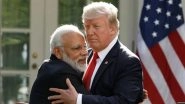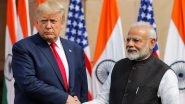By Shalini Bhardwaj
New Delhi [India], January 29 (ANI): Ahead of the presentation of the Union Budget 2022-23, which is scheduled to take place on February 1, healthcare industry professionals feel that health & well-being, which is one of the six crucial pillars of Aatma Nirbhar Bharat campaign, should also be given top priority in the budget this year.
The health professionals said that there is a need to further strengthen medical services in rural areas and equip tier 2-3 towns with facilities like diagnosis centres, ventilators, ICU, critical care facilities and oxygen plants.
The health professions shared with ANI that Tax incentives should also be extended to Research and Development to encourage further innovation in healthcare
Also Read | Delhi: Over 170 Homeless Died of Extreme Cold in National Capital in Past 28 Days, Says Report.
"The Government had rightly placed health and well-being as the first of the six pillars in the Union Budget 2021 and the focus must continue in 2022 too," Ashutosh Raghuvanshi, MD and CEO, Fortis Healthcare, told ANI.
"Firstly, the outlay for healthcare infrastructure is to be increased. Since the hospital sector is at the forefront as cases in India are on surge again, facilities in Tier 2-3 towns need to be equipped with diagnosis centres, ventilators, ICUS, critical care facilities and oxygen plants," he further said.
"We need greater investment in NCD programmes as comorbidities are driving pandemic deaths and long COVID ailments. There is an urgent need to allocate a separate budget for a national campaign around preventive health, testing and screening as these are key to reducing the overall disease burden in India," he added. "The Government needs to also focus on building asset-light models powered by digital health to drive out-of-hospital care, remote monitoring and home care to reduce the burden on hospitals. We need to strengthen the digital ecosystem to speed up the adoption of new technologies to foster telemedicine for diagnosis and treatment," he stated.
"There needs to be more investment in advanced training and capacity building programmes through affordable study tools and courses for doctors, nurses and healthcare workers in intensive and critical care, pulmonology, cardiology, oncology, emergency and trauma care," he further stated. "Healthcare should be accorded priority status so that the sector can derive benefit from the GST transition and providers and healthcare service delivery institutions can avail loans at lower rates and extended tenure. It is also essential that the Government reduces duty and cess for critical care and life-saving equipment and drugs to reduce costs for both providers and patients," he explained.
Meanwhile sharing her expectations from the budget, Apollo Hospitals Group Jt Managing Director Sangita Reddy said, "The pandemic has shown the potential of India to become a global centre for R&D in drugs and vaccines. Tax incentives should also be extended to R&D as this would encourage further innovation in healthcare."
"Another key area that the budget needs to address is skilling of healthcare workers. This will help to address the manpower challenge that we face and bring India up to par with the recommended ratio in terms of trained doctors and nurses. A policy for a PPO model in health education would help us to ramp up the healthcare workers to population ratio."
Further and most importantly encourage "health" care and not Sick care. Enhancing the health check-up exemption from Rs 15,000 to Rs 75,000 per family will be a true step towards
Indian Medical Association President Sahajanand Prasad Singh said, " Expectations from Indian Medical Association first to increase the allocation of GDP from 1.2 per cent to 3.3 per cent, the government should spend more on primary healthcare, need to provide services in rural areas, promotion of resources and production of drugs and medicines for the doctors and the people, issue of shortage of nurses and paramedics, we have to improve the quality of the hospitals in rural areas, we have to send doctors to the rural areas to serve the people." (ANI)
(The above story is verified and authored by ANI staff, ANI is South Asia's leading multimedia news agency with over 100 bureaus in India, South Asia and across the globe. ANI brings the latest news on Politics and Current Affairs in India & around the World, Sports, Health, Fitness, Entertainment, & News. The views appearing in the above post do not reflect the opinions of LatestLY)













 Quickly
Quickly


